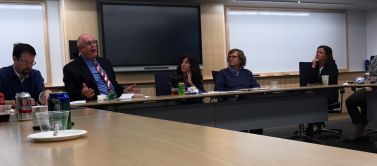
If one candidate were able to make economic issues and faith issues align, it would make voting a lot easier, Dr. Mary Van Brunt said.
“As a Catholic, when I vote, I think about my faith and I think about economics. Sometimes, they’re not always aligned,” Van Brunt said.
Van Brunt spoke on the “’It’s the Economy, Stupid’: Health, Security, and Fiscal Issues in the 2016 Election” panel that was held on Nov. 2, 2016 in the Grace Hall multi-purpose room. This event was hosted by the Wolfington Center and was the third panel in the “Voting With Your Conscience” series. The other panelists included Dr. Eric Malm and Dr. Jim Hedtke.
The event was attended by students and faculty who asked questions to the panelists and discussed important political issues, especially focusing on the economy.
“It’s different when you’re in the classroom and you have these professors,” junior political science and business major Kim Pepenella said. “Here, you can ask any question and they’ll be upfront because this is an adult conversation.”
The panel mainly focused on the issues of economic policies that are found in the current presidential election. It also focused on balancing these issues with people’s religious beliefs and consciouses. The framework for the discussion was based on the document “Forming Consciences for Faithful Citizenship: A Call to Political Responsibility from the Catholic Bishops of the United States.”
The first panelist to speak was associate professor of economics and business administration, Dr. Eric Malm. He quoted a definition of the conscious from the document that stated that the conscious is the voice of God. Malm spoke on thinking about issues from another perspective, and the perspectives of “the other.” Thinking about these things, he said, is what Cabrini’s mission is about.
“I think about education of the heart: connecting our hearts and our knowledge of service beyond one’s self, kind of connecting ourselves to politics,” Malm said.
The next panelist to speak was economics and finance professor Dr. Mary Van Brunt. She spoke about how people do not always understand how the economy works and about taxes. She showed concern for people having a lack of incentive if they were to have overly high taxes.
“The one thing I really get concerned about with increasing taxes at a really high level for the wealthy or corporations is if we squash that innovation, there’s no incentive for people to really find new ways to solve some of these problems,” Van Brunt said. “I just get concerned that if we don’t have that incentive that we’re gonna have trouble.”
The third panelist to speak was history and political science professor Dr. Jim Hedtke. He said that he drew his political convictions from three things: the world he is going to leave his children and grandchildren, the Christian tradition that he was raised with, and his knowledge of international relations.
“I’m looking for the candidate that is saying we’re gonna get it at the root causes, to work on moving brittle regimes into regimes where people have a say. I wanna hear the candidate tell me that,” Hedtke said. “If there’s no way we can get at the root problems, there’s no way we can foster education or economic growth.”
The floor was then opened up for questions and discussion. Topics discussed included climate change, tax fraud and a deeper discussion on economic issues. The current lack of political discussion within the classroom and the general educational system was also reflected upon.
“I think we’ve transferred academic freedom and freedom of speech to administrators,” Dr. Hedtke said. “We took it out of the hands of faculty and put it in the hands of administrators and now we’re afraid to talk in the classroom.”
Overall, this panel allowed for great discussion on important policies.
“I just enjoy listening and engaging in intercessional discourse,” senior history and political science major Matt Harshberger said. “It’s refreshing in the middle of the week to sit down and have a civilized discussion about political issues.”


